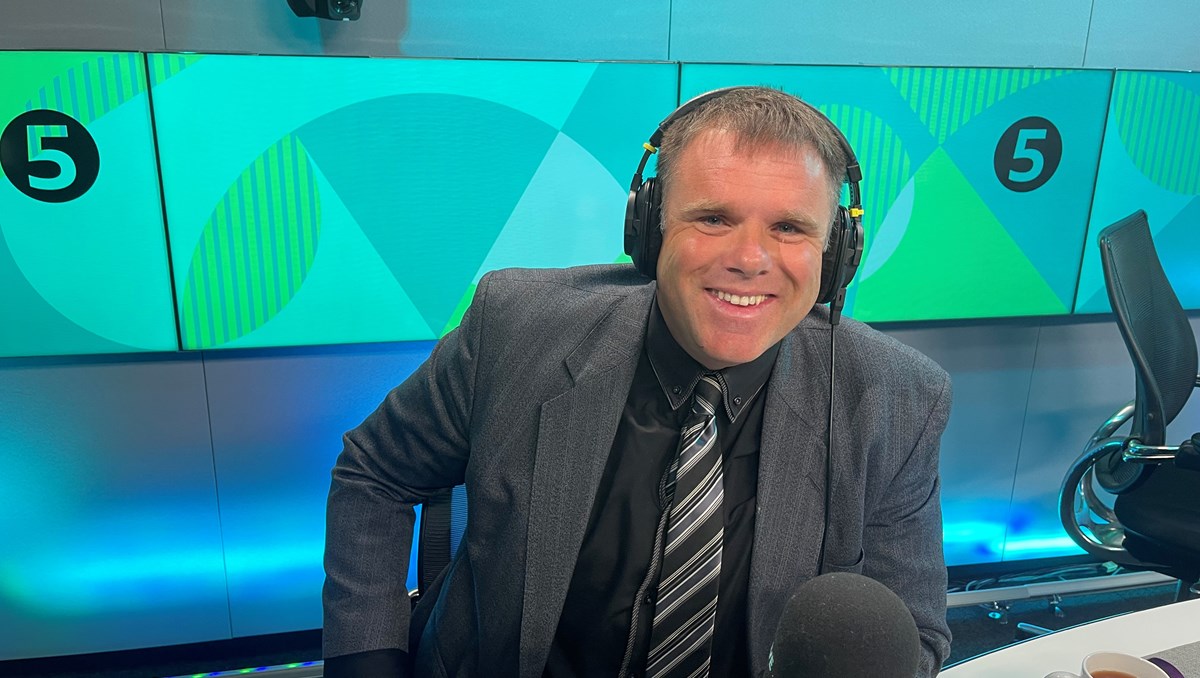Behind the mask: school leadership and autism
In this blog we hear from headteacher Darren Morgan who is autistic. He shares his personal experience of the difficulties he has experienced working in schools and the coping strategies that have helped him.
Articles / 8 mins read

Welcome to our blog series featuring voices of neurodiverse teachers, leaders and education staff. Here they will share their candid experiences of working in education, highlighting actions that support their mental wellbeing and foster real inclusion in the sector.
In this blog we hear from Darren Morgan, headteacher and the chair of primary heads for his local authority. Darren is passionate about headteacher mental health, including talking on BBC and various media outlets about this important matter.
I have always felt different. My primary school teacher asked my parents to investigate whether I was deaf as I did not interact. I lived in my own world, colouring everything in black as I did not (and still don’t) see the value in colouring in. My games involved lining cars (or anything) up, being fascinated with motion and as I got older, spending hours recording car number plates and composing complicated leagues involving fictitious matches and dice.
I’m still as weird!
When I announced to my SLT that I was being tested for autism, they laughed (with, not at me) and joked that this wasn’t news to them. Such warmth and acceptance! Recently they have listed my unique traits with reference to Mr Bean! (This is beginning to sound like bullying in the workplace!).
I think I’m an ok headteacher, I’m often told kind comments about my leadership from others (maybe everyone does?). Recently, I was elected as the chairperson of primary headteachers in my local authority.
Each day I try to be compassionate, kind and understanding of others, whilst striving for high standards.
With my mask on
I think all headteachers, all leaders and in fact all human beings present differently and have different approaches and viewpoints. My unique set up includes the challenges and opportunities that being an individual with autism affords me.
Before embarking on the challenges (in a bid to reduce isolationism of those in a similar position to me) I would like to briefly detail what I think I look like with my mask on!
I try to be sociable and warm, considering others’ emotions, but do confess to finding alternative viewpoints difficult. I genuinely find it difficult to embark on a collaborative task when I perceive that I could find the solution immediately.
I’m hyper organised. This includes excellent time-management and a strong focus. It also means that deviation from my agenda or routine creates great angst. Although I think I mask this!
Others would say that I am a good mathematician. They are wrong! I’m not, it’s just that I am better at maths than English. However, I love a graph. I love designing graphs (graphs that I designed to assess our internal data at Christmas numbered over 150!) and reading data.
I fixate and obsess over important and less than important matters! I think this strengthens my leadership as with some areas (that interest me) I can single-mindedly focus but find others’ procrastination bemusing.
I’m competitive! If there is a way to succeed I will (obsessively) find it; much to the chagrin of others!
In school I am vibrant and happy, often, behind the mask it is a different story. In school, I am in control but at the end of the day I am often dysregulated, finding managing my emotions a challenge.
Under my mask
However, my daily mask comes at a great personal cost.
My diagnosis focused on three areas, social, communication and emotional. Sadly, I have difficulties in each of these areas. Whilst I know lots of people, I don’t really have many friends. This makes me sad and lonely. As mentioned, my SLT are wonderful, and we regularly spend time together. I value reliability but find the time before each gathering with this or other groups of people full of anxiety and always dream of pulling out. Once there, I have great time.
In other circumstances I notice that people don’t sit next to me. Whether in a staff meeting, a social gathering or with a group of headteachers, it appears that the chair next to me tends to be the last to be filled. Behind my mask – this makes me feel unattractive and alone.
To a large group of people, I am a charismatic and lively communicator. I lead headteachers, have spoken repeatedly on the BBC, lead two table tennis leagues and preach at church. Feedback tends to be positive (maybe it is for everybody!).
However, I find 1-to-1 conversations very difficult. I find small talk very challenging; I don’t know where to look, what to do with my hands/body or what to talk about. If it’s about a subject matter that doesn’t interest me, I find it difficult to hide my disinterest. If it’s a small group discussion I don’t know how or when to interject – I seem to always get this wrong
Finding strategies that help
In school I am vibrant and happy, often, behind the mask it is a different story. In school, I am in control but at the end of the day I am often dysregulated, finding managing my emotions a challenge. I live on my own and tend to go to bed before 8.30pm as I find the solitude very difficult. After my daily walk I watch the beginning of an episode of Star Trek (surprise, surprise!) and then it’s bed for me. This winter has felt particularly long and dark.
But, over time I have found strategies that help me:
- Talking to my SLT
They don’t let me get away with anti-social behaviour and regularly force me to see perspective. Most importantly, they value me and care for me. I think social support from others is vital. - Spending time with others
It is important to spend time with people. Positive social health is invigorating. I know there is a temptation to spend time alone – fight this when you can. You will feel better! - Being kind to myself
This can take the pressure of high expectation and negative self-analysis away. I suggest focusing on your positive traits and remembering you will mean a great deal to a great deal of people. - Getting some exercise
Physical health is a game changer! During Covid I started walking six miles every night, which generally I have maintained. The fresh air and exercise significantly help my physical and mental health. I try to eat (reasonably) well and exercise regularly. - Asking for help when I need it
Education Support is full of good people who want to help. My advice is during times of difficulty is to give them a call on 08000 562 561 – you will hear a friendly, compassionate, and understanding voice.
It is important to remember that everyone’s coping strategies will look different – regardless of being autistic or not. In order to identify your own coping strategies it might help to step off the work treadmill for a few minutes and undertake some self-reflection. Find a quiet environment where you hopefully won’t be disturbed and try to write down five or six bullet points of your go-to ways that support you to feel good during challenging periods.
Once you start this exercise, even if you were in two minds, you might be surprised at what comes out. Remember, you can be honest as no one else will read it.
Ambitious about Autism has some good information on how to self-regulate in difficult times and tips on managing anxiety that some may find helpful. Autistica also has a free app called Molehill Mountain that can help autistic people understand and manage their anxiety.
It is important to remember that everyone’s coping strategies will look different – regardless of being autistic or not.
Did any of this sound familiar?
There is a chance that some of you reading this may feel it describes your own experiences (or those of someone close to you). And you may be asking yourself – am I/they autistic? Or perhaps it is something you have been thinking about for a while, or it has come up in conversation with someone you know, at home or school?
According to the National Autistic Society it's quite common for people to have gone through life without an autism diagnosis, feeling that somehow they don't quite fit in. Many people learn to cope with life in their own ways, although this can be hard work!
It should always be up to an individual whether they seek a diagnosis (there is no right or wrong answer here). Some people feel a diagnosis would help them, some are happy to remain self-diagnosed, while others see a formal diagnosis as an unhelpful label.
What might be the benefits of a diagnosis?
The National Autistic Society suggest a number of reasons why getting a thorough assessment and diagnosis may be helpful:
- It may help you (or your colleagues, family, employer etc) to understand why you may experience certain difficulties and what you can do about them.
- You will be entitled to have reasonable adjustments made by your school or education setting.
- It may correct a previous misdiagnosis and mean that any mental health problems can be better addressed.
- It may help you to get access to appropriate services and benefits.
- It may help women, who may not before have been recognised as autistic by others.
Getting a diagnosis or support
The National Autistic society provides useful information on pre and post diagnosis support and steps to take when seeking a diagnosis, including approaching your GP. They also have a range of resources written by professionals and autistic people who share their knowledge, good practice, research and advice for anyone working with autistic people.
This video on how to deal with loneliness and autism offers coping strategies and advice. Or you can take a look at this practical guide on loneliness by Education Support aimed at all staff.
If you are a school leader who would like to provide ongoing confidential support and guidance for yourself and your staff all year round, make sure you take a look at their Employee Assistance Programme (EAP).
And don’t forget, all teachers and education staff can call Education Support’s free and confidential helpline 24/7. When you call you’ll talk to a qualified counsellor for immediate, confidential emotional support: 08000 562 561
About Darren
Darren started teaching in 1998 and became a Deputy in his 4th year. He held two Deputy posts and became a headteacher in 2010. He is now in his second headship which began in 2015. He has been chosen as the chair of primary heads for his local authority and came 2nd in Pearson's Headteacher of the Year awards.
Sources
- Pre-diagnosis support - a guide for adults who think they might be autistic, National Autistic Society, August 2021: https://www.autism.org.uk/advice-and-guidance/topics/diagnosis/pre-diagnosis/adults
- Role-modelling as a busy leader by Lynn How, Education Support: https://www.educationsupport.org.uk/resources/for-organisations/articles/role-modelling-wellbeing-as-a-busy-leader/
- Loneliness: a guide for teachers and education staff, Education Support: https://www.educationsupport.org.uk/resources/for-individuals/guides/loneliness-a-guide-for-teachers-and-education-staff/
Don’t wait for a crisis to call.
We’ll offer you immediate, emotional support.
08000 562 561

Sign up to our newsletter for the latest mental heath and wellbeing resources, news and events straight to your inbox.





















